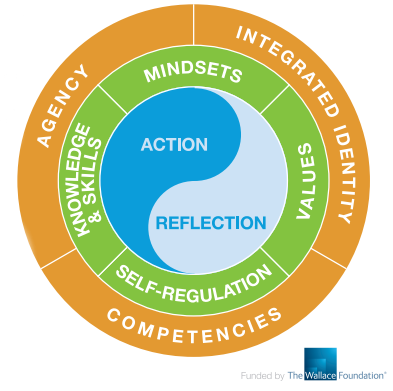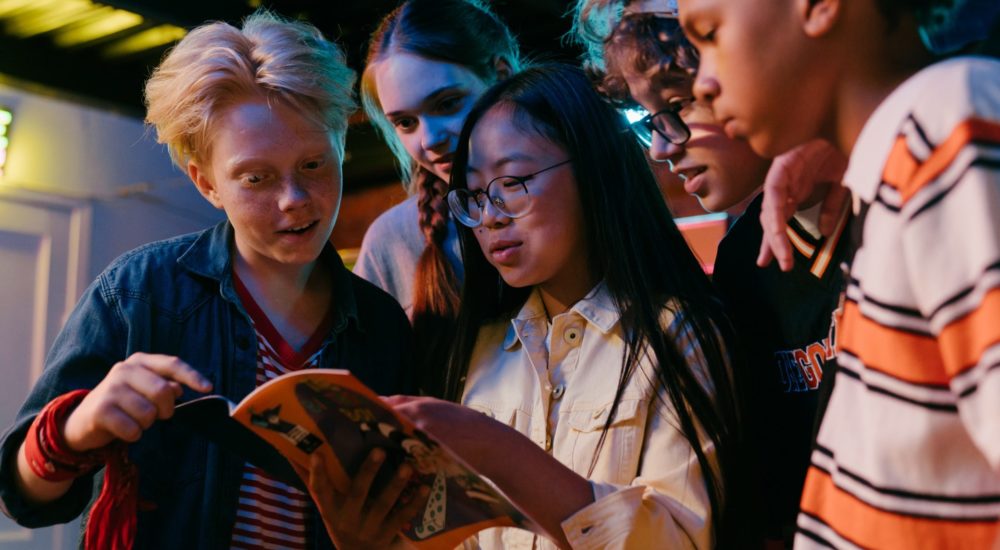My work at pilotED Schools includes designing an identity development curriculum that includes representative history and civic engagement woven together with transformative social and emotional learning practices. A key feature of the adolescence development journey is determining who one is and deciding who one will be through identity exploration and development. Let’s chat about identity development today!
One framework that I turn to often in my work is the Foundations for Young Adult Success: A Developmental Framework, created by the University of Chicago Consortium on Chicago School Research. It’s a fascinating study and includes an abundance of practical ways to implement identity development practices.

Identity is not a static life event but is the ever-evolving process of accounting for our core beliefs, purposes, values, goals, roles, and experiences to create a stable and consistent sense of one’s “wholeness.” Furthermore, the Developmental Framework explains that having an integrated identity is recognized as “having a sense of internal consistency of who one is across time, across place, and across multiple social realms. An integrated identity provides an internal framework for making sense of how one’s choices and actions are related to one’s past, one’s current social identities, and one’s desired future.”
Context plays a crucial role in our development as humans. One of the important conditionings for identity formation is determined by the educational context of different types of schools that young people attend. While developing an integrated identity is a complex process for everyone, it is particularly challenging for youth growing up in marginalized communities. This statement in itself is a completely other blog post, workshop, life-long practice, and so forth! We have to commit ourselves to ensuring that all youth develop a collection of competencies that allows them to confront social inequities and work toward a more inclusive society. That’s why we are here in this out-of-time school space, right? We stand with and for our youth.
Something that has impacted my work of identity development has been the idea of developmental experiences and developmental relationships. I can’t write it anymore clearly and beautifully than the team at the University of Chicago, so here it is:
“Developmental experiences are opportunities for action and reflection that help young people build self-regulation, knowledge and skills, mindsets, and values, and develop agency, an integrated identity, and competencies. Experience must be assigned meaning and be integrated into one’s emerging sense of identity if it is to have lasting or transferrable benefit. Critical to the process of making meaning out of developmental experiences are strong, supportive, and sustained relationships with caring adults who can encourage young people to reflect on their experiences and help them to interpret those experiences in ways that expand their sense of themselves and their horizons.”
It is exciting to think about the ways we can empower students as current and future agents of change, empowering them to explore and understand their identities, and be the ones who create lasting change in our communities and around the world.
I am just touching the surface of identity development in this blog post so I encourage you to start by reading the Foundations for Young Adult Success: A Developmental Framework and checking out just a few resources for how to implement identity development into your program.
- Exploring Identity, Facing History and Ourselves
- Social Justice Standards//Identity Anchor Standards, Teaching Tolerance
- Classroom Belonging Strategy – Establish an Identity-Safe Environment, BELE
- Designing for Learning Primer//Identity (pg. 43-52), Transcend
- Amplifier Educators
For breakfast, I had oatmeal with a banana and an iced green tea.
Author: @kristinstayer
